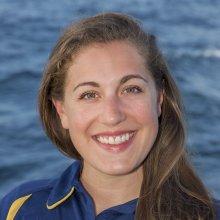
Ashley Marranzino
Tell us about your work / research. What kinds of things do you do?
My research focuses on the sensory biology and ecology of deep-sea fishes. The deep oceanic midwaters are quite different from shallow water ecosystems: the light is limited and there are no structures to hide behind. This creates a complicated sensory environment that animals must navigate in order to find food, attract mates, and avoid predators. Studying how animals sense the environment around them can tell us more about what drives their behaviors and ecology. Because it is difficult to observe these fishes in the wild and it is currently impossible to keep deep-sea fishes alive in laboratories, my research hinges on the examination of preserved specimens that have been collected at sea. I study the anatomy and morphology or different sensory systems to gain insights into the capabilities of the sensory system and how the fishes might use their different senses to guide behaviors.
What sparked your initial interest in your career?
My parents took me SCUBA diving when I was 10 years old and I immediately fell in love with marine biology. I didn't realize I could turn my passion into a career until I was in my second year of my undergraduate program. After interning at a local aquarium and working on marine-related research projects, I knew I wanted to pursue a career that allowed me to conduct research and continually learn about the incredible animals living in our oceans.
Who influenced you or encouraged you the most?
My parents have always been my biggest fans. Their undying support and love has allowed me to push forward in a field that is not always the easiest or most rewarding.
What element of your work / study do you think is the most fascinating?
I love going into the field and conducting research at sea, but I find myself most excited to get back into the lab and take a close look at the specimens I collected. I am endlessly fascinated by the tiny structures you can only see when you take time to examine a specimen under a microscope.
What other jobs led you to your current career?
I explored several areas of research before landing in deep-sea biology. I worked as a research assistant in a genetics lab, interned as an aquarist, and conducted various marine-related research projects before starting my Master's degree program, where I studied deep-sea fishes. After receiving my Master's degree, I continued to explore different career paths like teaching, working at aquaculture research facilities, and exploring science avenues in science communication.
What are your degrees and certifications?
Bachelor of Science in Biology -- Regis University 2013; Masters of Biological and Evolutionary Sciences -- University of Rhode Island 2016
What are your hobbies?
I like getting outside and being active. I enjoy spending time at the beach, going for hikes, and riding my bike. I also like to SCUBA dive whenever I get the opportunity.
What advice would you give to someone who wants to have a career like yours?
If you want to be a marine biologist, I think it is important to figure out what discipline and work you like the most (i.e. do you like studying genetics in a lab or going into the field to perform ecological monitoring?). Don't be afraid to test different fields out though - you may find you enjoy something new or you could learn a new skill that is applicable to your own research down the road! Work hard, make as many connections as you can, and be persistent. Finally, learn to talk to the public - we need more scientists who can communicate to non-scientists to get them excited about what we do!
How did you get involved with the Nautilus Exploration Program? How did you get on the ship?
I followed Ocean Exploration Trust's live-stream expeditions for years before I learned about their internship program. While I was finishing up my Master's program, I applied for a position as a Science Intern and was accepted to the program. I have continued on as a member of the science team in several expeditions.
I love that every mission teaches us more about the deep sea. We know a lot about our oceans, but there is always the promise of discovering something new when you send cameras down to an area for the first time!
Expeditions
Ashley participated in the following Ocean Exploration Trust expeditions:
